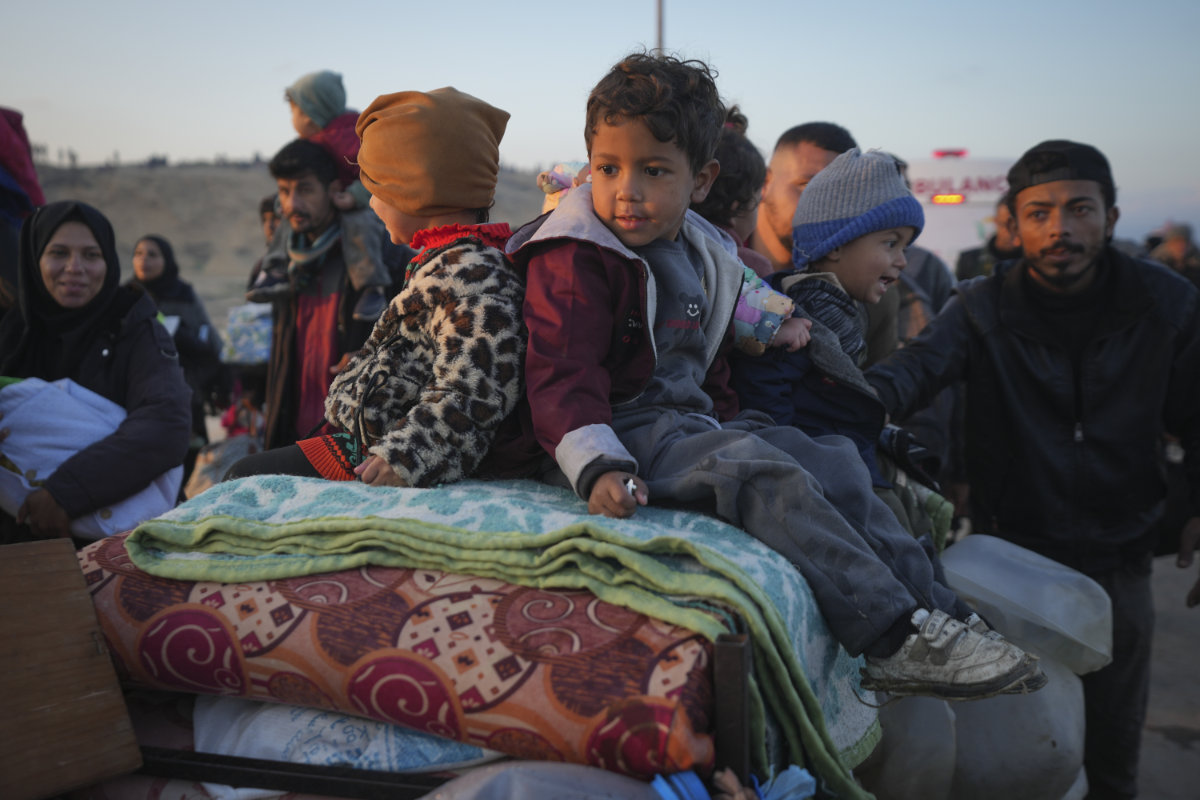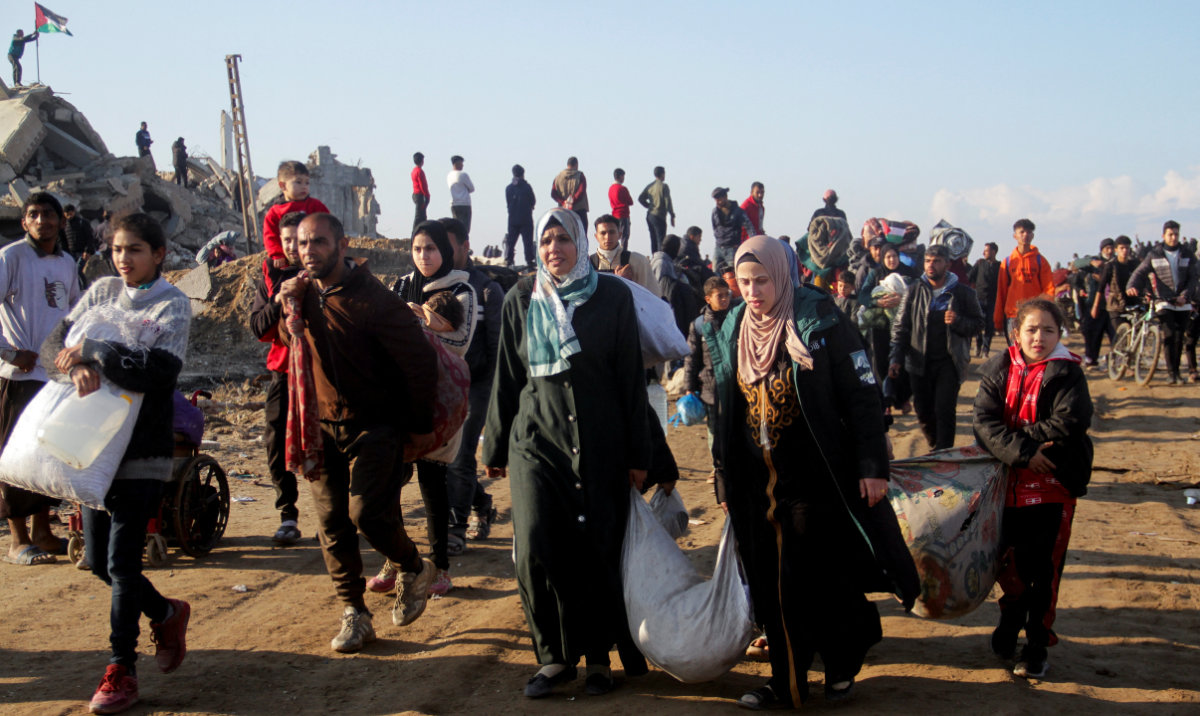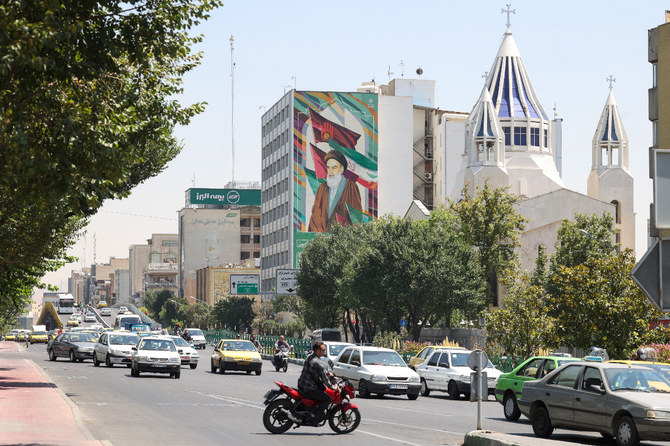TEHRAN: Iran has arrested 12 members of the Bahai religious minority, accusing them of links with the Islamic republic’s arch enemy Israel, state media reported late Saturday.
Iran brands Bahais “heretics” and often accuses them of being spies linked to Israel, as their world headquarters are located in the northern Israeli city of Haifa.
“The General Directorate of Intelligence in Mazandaran province has identified and arrested 12 members of the Bahai Zionist organization in different cities of the province,” reported Iribnews, the state television website.
“Two of the leaders of this spy organization were trained in Bayt-al-Adl,” the Bahais’ Universal House of Justice in Haifa, it said about those arrested in the northern province.
Iran, where Shiite Islam is the state religion, recognizes minority faiths including Christianity, Judaism and Zoroastrianism, but not Bahaism with followers estimated to number 300,000 in Iran.
Iran’s intelligence ministry had last announced in early August that it had arrested Bahais suspected of spying and of working illegally to spread their religion.
They had been instructed to “infiltrate educational environments at different levels, especially kindergartens across the country,” the ministry said then.
In December 2018, the United Nations General Assembly adopted a resolution calling on Iran to end human rights violations against minority religions including the Bahais, citing “harassment, intimidation, persecution, arbitrary arrests and detention” among other breaches.
The Bahai faith is a relatively modern monotheistic religion with spiritual roots dating back to the early 19th century in Iran, promoting the unity of all people and equality.
The Bahai community claims to have more than seven million followers worldwide.
Iran arrests 12 Bahais accused of links to Israel
https://arab.news/bpd8d
Iran arrests 12 Bahais accused of links to Israel

- Iran brands Bahais “heretics” and often accuses them of being spies linked to Israel
International Criminal Court prosecutor calls for urgent action on Darfur

- Addressing the UN Security Council, he pleads for more support to help bridge the ‘impunity gap’ and ensure those guilty of crimes against humanity are held accountable
- He paints grim picture of violence, famine and gender-based crimes that continue to devastate communities in western Sudan, targeting women and children in particular
NEW YORK CITY: The International Criminal Court’s prosecutor, Karim Khan, on Monday stressed the urgent need for international action to address continuing atrocities in the Darfur region of western Sudan, and pleaded with the UN Security Council for more support to help bridge the “impunity gap.”
He painted a grim picture of a situation in which violence, famine and gender-based crimes continue to devastate communities, targeting women and children in particular.
Khan underscored a severe decline in the situation in the region over the past six months, including growing reports of civilian casualties, the destruction of vital infrastructure, and widespread violations of human rights.
“Famine is present in Darfur. Conflict is increasing. Children are targeted. Girls and women are subject to rape,” Khan said as he described the environment as one of “destruction” and “criminality.”
The country descended into civil war in April 2023 amid a conflict between rival military factions the Sudanese Armed Forces and the paramilitary Rapid Support Forces. It has killed more than 28,000 people, forced millions to flee their homes, and some families have resorted to eating grass in a desperate attempt to survive as famine sweeps parts of the country.
In Darfur, ethnic violence has escalated since the war began. The RSF, the origins of which lie in the Arab Janjaweed militia that was responsible for a genocide in the early 2000s that claimed about 300,000 lives, has focused its attacks on the Masalit ethnic group and other non-Arab communities.
This month, the US has accused the RSF of genocide and imposed sanctions on its leader, Mohamed Hamdan Dagalo, commonly known as “Hemedti.”
Khan’s latest semi-annual report on the situation in Sudan, published on Jan. 16, noted that his office has gathered sufficient evidence to establish reasonable grounds to believe that a wide range of crimes specified under the Rome Statute, the treaty that established the ICC, continue to be committed in Darfur. These include killings, pillaging, attacks against internally displaced persons, the indiscriminate targeting of civilian populations, gender-based crimes, and crimes against and affecting children.
Under the Rome Statute, the ICC has jurisdiction over four types of crime categorized as “international crimes”: genocide, crimes against humanity, war crimes, and the crime of aggression. The court is finalizing applications for arrest warrants against individuals allegedly responsible for war crimes in West Darfur, Khan said. He stressed, however, that the applications will only be filed when there is strong evidence that can withstand judicial scrutiny, to ensure the highest chances of convictions and due process for victims.
He warned that international crimes are being committed as weapons of war in Darfur, including reports of widespread gender-based violence.
“This is not an unverified generalization,” he said, adding that the evidence his office has gathered, including witness testimonies and digital resources, is both extensive and credible.
Khan highlighted his office’s collaboration with national authorities in neighboring countries, where they have also been collecting evidence from displaced communities.
He also mentioned ongoing trials taking place at the ICC, in particular the trial of Ali Kushayb, a former militia leader charged with crimes committed in Darfur in the early 2000s, which began in 2022. Khan highlighted the significance of such trials, not only in terms of pursuing historical accountability but also as a beacon of hope for survivors who continue to suffer in Darfur.
“They say that they are not forgotten, they are not invisible,” Khan said, as he reiterated the ICC’s role in keeping the promise of justice alive for victims long denied recognition.
Despite these efforts, Khan acknowledged the deep frustrations arising from the lack of swift progress in Darfur. He pointed to the need for greater cooperation from Sudanese authorities, and said that while there have been some signs worthy of cautious optimism, more support from the UN Security Council is needed to help bridge the “impunity gap.”
Khan called in particular for the transfer of suspects, including Ahmed Harun, a former governor of Kordofan and minister of state who is wanted by the ICC for his alleged role in the Darfur conflict.
“We believe we know where Ahmed Harun is,” Khan said as he urged Sudan to honor its obligations under Security Council Resolution 1593, which requires authorities to cooperate fully with the ICC.
Khan invoked the historical significance of ensuring accountability for crimes against humanity, drawing parallels with past genocides, including the Holocaust. He called on the Security Council to prioritize the victims of Darfur over political divisions among council members, and echoed the sentiment that justice must be delivered to those who are suffering in the region.
He urged the council to renew its commitment to the principle of “Never Again,” referencing the outcome of the Nuremberg Trials and global efforts to combat cultures of impunity in post-conflict societies.
“The people of Darfur have a right to justice,” Khan said. “It’s time for us collectively to join hands and deliver on that promise.”
The US has historically backed ICC efforts related to Sudan. However the court faced criticism late last year after it issued arrest warrants for Israeli Prime Minister Benjamin Netanyahu and former Defense Minister Yoav Gallant.
Those warrants, related to charges of crimes against humanity and war crimes linked to Israeli military operations in Gaza since October 8, 2023, sparked a backlash from Washington.
Northern Gaza is shattered. The spirit of returning Palestinians is not

- Under the ceasefire deal between Israel and Hamas, Palestinians were allowed starting Monday to return north
- Those returning crossed through the Netzarim corridor, a swath of land bisecting the Gaza Strip that Israeli forces turned into a military zone to seal off the north
WADI GAZA, Gaza Strip: They walked for hours loaded with whatever clothes, food and blankets they could carry. Many smiled, some hugged loved ones they hadn’t seen for months. Hundreds of thousands of Palestinians filled Gaza’s main coastal road as they streamed back to homes in the north.
The mood was joyous, even though many knew their homes had been destroyed in Israeli offensives against Hamas that leveled large parts of Gaza City and the surrounding north.
The important thing was to go back, they said, to prevent what many had feared would be a permanent expulsion from their homes.
“By returning, we are victorious,” said Rania Miqdad, who was heading back to Gaza City with her family.
Ismail Abu Mattar returned with his wife and four children to the ruins of their Gaza City home, which was partially destroyed by Israeli bombardment early in the war. Like many others whose houses are damaged, he planned to set up a tent nearby and start clearing the rubble.

“A tent here is better than a tent there,” he said, referring to the vast, squalid tent camps that arose in central and southern Gaza where he and much of the territory’s population have lived for months.
“We had thought we wouldn’t return, like our ancestors,” said Abu Mattar. His grandparents were among the hundreds of thousands of Palestinians driven from what is now Israel during the 1948 war surrounding its creation.
A mass return on foot and by car
Under the ceasefire deal between Israel and Hamas, Palestinians were allowed starting Monday to return north. UN officials estimated that some 200,000 people made their way back over the course of the day. The scenes of celebration were a sharp contrast to the misery and fear during the war as more than 1 million people fled south on the same routes to escape Israel’s assaults.
Associated Press photos, videos and drone footage showed huge crowds heading north on foot along Gaza’s main coastal road. On one side was the Mediterranean Sea; on the other stretched a landscape of destroyed buildings and bulldozed land left behind by withdrawing Israeli forces. Armed Hamas fighters were visible in some spots, a sign of the militant group’s continued power in Gaza despite Israel’s vows to eliminate it.

Families carried bags of belongings and rolled up blankets. On their shoulders, men carried young children — or sacks of food and metal cannisters of cooking gas. Women balanced infants in their arms with satchels of clothes and jugs of water.
A little girl dressed in teddy-bear pajamas held her younger sister’s hand as they trailed their mother. A teenager strapped a pet carrier to his chest with his cat inside.
Others returned in cars and trucks piled high with mattresses and other belongings via a second route, Salah Al-Din Road.
Many were smiling. A child waved a “V-for-victory” sign. People tearfully hugged relatives and friends they’d been separated from for months.
One old woman being pushed in a wheelchair sang a traditional Palestinian song of perseverance dating back to 1948.
“Stand by each other, people of Palestine, stand by each other. Palestine is gone, but it has not bid you a final farewell,” she sang with a smile on her face. Then she added, “Thank God, we’re returning to our homes, after suffering so much ruin and hunger and disease.”
The joy was tempered by war’s cost and future’s uncertainty
Those returning crossed through the Netzarim corridor, a swath of land bisecting the Gaza Strip that Israeli forces turned into a military zone to seal off the north. The north saw some of the most intense Israeli offensives, aimed at eliminating Hamas fighters operating in densely populated areas.
Throughout the war, Israel repeatedly ordered civilians to evacuate the north – for their safety, it said – but barred their return. Under the ceasefire’s terms, Israeli troops pulled back from the main routes to allow returns and are eventually to pull out completely from the corridor.
For some, the joy of return was blemished by the deaths of loved ones.

Kamal Hamadah was returning to Gaza City, where his eldest son, his daughter and her children were killed by bombardment early in the war. Their bodies were left buried under rubble in the streets, even as the rest of the family fled south, he said.
Then just over a month ago, another of his sons who fled with him was killed.
“When his mother learned we were going back home, she was struck by a great sadness that she was returning without the boy,” he said.
Returning home, Yasmin Abu Amshah had a happy reunion with her younger sister, Amany, who had stayed in Gaza City throughout the war. “I thought it wouldn’t happen, and we wouldn’t see each other again,” the 34-year-old mother of three said.
Her four-story building was damaged but not destroyed, so she and other members of her extended family will stay there.
Those returning face an uncertain future. If the ceasefire collapses, they could face new Israeli offensives. If peace lasts, it’s not clear when Palestinians will be able to rebuild homes, leaving much of the population in temporary housing.
Ibrahim Hammad, his wife and five children walked five hours back to their neighborhood in Gaza City – knowing their house there had been destroyed by an airstrike in December 2023. His family will stay at his brother’s house until he can clear a space in the ruins of his house to set up a tent.
“We had to return, even to the rubble,” the 48-year-old told the AP. “Here we don’t have a house, but our family is here, and we will help each other.”
Freed hostages’ smiles deceptive, Israel’s military says

JERUSALEM: Israel gave a grim account Monday of seven freed hostages’ health, saying that despite a “show” by Hamas to present them as healthy and smiling, they faced a long recovery from their ordeal.
The seven women freed so far under Israel’s ceasefire deal with the Palestinian militant group were all malnourished, exposed to psychological suffering and wounded in various ways, said the deputy chief of the Israeli army’s medical corps, Col. Avi Benov.
Images of four Israeli soldiers — aged 19 and 20 — released in Gaza on Saturday by Hamas showed them looking healthy and smiling. They greeted people around them and clutched parting gifts in paper bags as they were handed over to the Red Cross.
But Benov said there was more to the story.
“They were given more food in the days before (their release), they were allowed to shower, they were given (new) clothes,” he said in a video call open to the media.
“This is part of the show organized by Hamas.”
Since the deal took effect on January 19, the militants have freed a total of seven Israeli hostages in exchange for 290 prisoners, all Palestinians except for one Jordanian.
But despite the hostages’ joy and relief at being reunited with their families, it “will take time” for them to recover, said Benov.
Hospitalized after their release, the women have been diagnosed with physical health problems including malnutrition, vitamin deficiencies and a metabolic system “in bad shape,” he said.
Some of the hostages had been held for the past eight months in tunnels, Benov said.
“For them it’s more complicated because light, sun and to be able to talk with someone are essential elements to be physically and mentally healthy,” he said, without naming them or giving further details.
All the hostages were “wounded one way or the other” when they were captured on October 7, 2023 in the Hamas attack that ignited the ensuing war, Benov said.
Their wounds were poorly treated in captivity, or not at all, he added.
Hostages who were freed during a previous truce in November 2023 have said some wounded captives were operated on with no anaesthesia.
But the most “complicated” wounds are psychological, said Benov.
“Even if they look happy, a fear remains. It’s hard for them to believe that this time around they’re in good hands, that it’s not another show organized by Hamas,” he said.
Benov declined to answer a question on whether the hostages had been victims of physical abuse, torture or sexual violence, saying it was important to “protect their privacy.”
“They will tell what they went through, if they want to, in a few weeks or a few months,” he said.
An Israeli health ministry report sent in December to the United Nations special rapporteur on torture said the hostages released in November 2023 had suffered various forms of physical and psychological violence.
It said freed hostages had reported being branded with hot irons, beaten, sexually assaulted, held in isolation and deprived of food.
Numerous ex-hostages showed signs of post-traumatic stress disorder, depression, anxiety and survivor’s guilt, the report said.
Benov said hostages set for release in the coming weeks would likely be in even worse health.
Under the deal, they include captive men over 50 or in poor health.
“We are expecting that the next hostages to be released, who are older, with some of them already ill when they were kidnapped, will come back in worse condition,” he said.
UN agency for Palestinians readies to shutter operations in East Jerusalem after Israeli ban

- The UN rejects accusations of bias and says that UNRWA’s expertise is irreplaceable, particularly in Gaza
JERUSALEM: Tens of thousands of Palestinian refugees in Israeli-occupied East Jerusalem were set to lose education, health care and other services provided by UN agency UNRWA as an Israeli ban on the organization takes effect on Thursday.
Israel’s government ordered UNRWA to vacate its East Jerusalem compound and cease operations under a law passed last year outlawing the agency and prohibiting Israeli authorities from having contact with it.
At UNRWA’s offices in East Jerusalem’s Sheikh Jarrah neighborhood, workers were packing boxes and loading portable buildings onto a truck on Monday.
“It’s an unacceptable decision,” said Jonathan Fowler, a spokesperson for UNRWA, formally titled the United Nations Relief and Works Agency for Palestine Refugees in the Near East.
“The people that we serve ... we are not able to tell them what is going to happen to our services as of the end of this week.”
Israel has not announced provisions for replacing UNRWA’s activities, and the Israeli prime minister’s office did not immediately respond to a request for comment.
UNRWA has for decades run schools and clinics in East Jerusalem, the eastern part of the city that Israel has occupied since a 1967 war, for tens of thousands of Palestinian refugees who have no nationality.
“We have everything here for us. When I heard that it will close, I was very sad because here is a place for people in need and for people who don’t have money to pay for medication,” refugee Sara Saeed said at the UNRWA medical center in Jerusalem’s Old City.
Medical center Director Hamza Al Jibrini said the facility serves 30,000 refugees. Among them are patients with diabetes and high blood pressure, pregnant women and children who receive vaccinations, said head of nursing Manal AlKhayat.
“Where they will go?” she asked.
Israel’s ban only directly covers Israeli territory, which Israel considers East Jerusalem to be. UNRWA also operates in the occupied West Bank and Gaza, but it was unclear how the law will affect UNRWA’s work there.
ISRAEL CLAIMS BIAS
UNRWA was established some 75 years ago, serving around 750,000 Palestinian refugees from the 1948 war at the time of the creation of the state of Israel.
Its sprawling headquarters are in a prime position not far from Jerusalem’s Old City, which is home to sites holy to Christians, Jews and Muslims. The agency has long been a thorn in the eye of Israeli governments that considered the agency fundamentally hostile to Israel.
Israel says UNRWA’s continued existence decades after the 1948 war has consolidated the refugee status of generations of Palestinians, who now number in the millions, and has frozen the conflict in place.
Israel regularly accuses the agency of anti-Israel bias and has also claimed its staff includes members of Hamas, the Palestinian militant group that launched the deadly cross-border raid on Israel on Oct 7, 2023. Israel calls for UNRWA’s responsibilities to be taken over by other UN bodies such as its main refugee agency.
The UN rejects accusations of bias and says that UNRWA’s expertise is irreplaceable, particularly in Gaza.
A UN investigation found that nine UNRWA staff may have been involved in the Hamas attack. The agency fired them but said Israel had not provided evidence of more widespread involvement by its staff. UNRWA employs around 30,000 people in the region and some 13,000 in the Gaza Strip.
More than 200 UNRWA staff have been killed in Gaza, the agency says, since the Gaza war started. Around 1,200 Israelis and foreigners were killed in the Oct. 7, 2023 attack and another 250 were taken hostage into Gaza, Israel says.
Over 47,000 Palestinians have been killed in Gaza since Israel’s military launched a retaliatory offensive, according to Gaza’s health ministry.
Israeli president calls UN morally bankrupt on Holocaust anniversary

UNITED NATIONS: Israel’s president attacked the UN General Assembly in a speech on Monday marking the 80th anniversary of the Holocaust, accusing the body of exhibiting “moral bankruptcy” and failing to confront anti-Semitism.
Isaac Herzog addressed the forum during worldwide commemorations of the Holocaust in which six million Jews were murdered.
“Today, we find ourselves yet again at a dangerous crossroads in the history of this institution,” Herzog said at the New York headquarters of the United Nations which Israel has repeatedly condemned since the Hamas attacks of October 7, 2023.
“Rather than fulfilling its purpose and fighting courageously against a global epidemic of jihadists, murderers, and abhorrent terror, time and again this assembly has exhibited moral bankruptcy.”
UN bodies like the International Criminal Court, which issued a warrant for the arrest of Israeli premier Benjamin Netanyahu, “opt for outrageous hypocrisy and protection of the perpetrators of the atrocities.”
“How is it possible that international institutions, which began as an anti-Nazi alliance, are allowing anti-Semitic genocidal doctrines to flourish uninterrupted in the wake of the largest massacre of Jews since World War II?” he added referring to the October 7 attacks.
Hamas’s October 2023 attack resulted in the deaths of 1,210 people, mostly civilians, according to an AFP tally based on official Israeli figures.
Israel’s retaliatory offensive has killed at least 47,317 people in Gaza, the majority civilians, according to figures from the Hamas-run territory’s health ministry that the UN considers reliable.
Ahead of Herzog’s denunciation of the UN, its Secretary-General Antonio Guterres condemned the “appalling October 7 terror attacks by Hamas” — as well as the rising tide of anti-Semitism globally.
“Today, our world is fractured and dangerous. Eighty years since the Holocaust’s end, anti-Semitism is still with us — fueled by the same lies and loathing that made the Nazi genocide possible. And it is rising,” he said on the occasion of the 80th anniversary of the liberation of the Auschwitz-Birkenau death camp and International Holocaust Remembrance Day.
“Indisputable historical facts are being distorted, diminished, and dismissed. Efforts are being made to recast and rehabilitate Nazis and their collaborators. We must stand up to these outrages.
“The history of the Holocaust shows us what can happen when people choose not to see and not to act.”





















